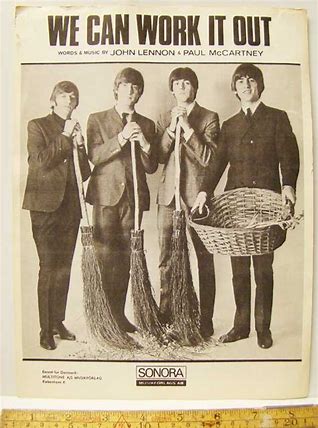The famous song by The Beatles We Can Work It Out is the inspiration for this blog. It’s a statement of positivity and hope. It can be applied to many situations. The word “We” highlights a collaborative approach to address a challenging situation that one or more people find themselves in. The word “Work” is so prominent. Work is a word with many meanings. In the case of the song title it is as a verb; work can also refer to a person’s productive occupation.
I have always been interested in the role occupational therapy has assisting people to have a meaningful and healthy work life. For many people their work takes up more of their time than any other category of occupation. The type of work people do varies and can be paid or non-paid. Non-paid work includes full time parenting, study, retirement and volunteering. All types of work bestow physical, mental and social benefits to the individual and a significant contribution to society.
But what are the barriers to work that some people face? Can We Work It Out? Research I conducted on census data shows that the labour force category “unable to work due to permanent illness/disability” has been increasing over the last two decades. And this only reflects people who consider this to be their situation; there are many more who consider themselves able to work but are not in work and unlikely to gain employment due to negative perceptions of the work abilities of people with mental and physical challenges. One way of addressing this is through people with negative perceptions having contact with people with disabilities who are working. However, for this to occur it is necessary to assist people with disabilities to gain and retain employment and for people who acquire a disability during their working life be assisted to retain their job. There is a specific scheme for the latter, the Employee Retention Grant Scheme, in which occupational therapists can play an important role.
The Employee Retention Grant Scheme aims to help private sector employers to keep employees who acquire an illness, condition or impairment (occupational or otherwise) that affects their ability to carry out their job. The grant helps employers to explore an employee’s continuing ability to operate as a member of the workforce. The scheme recognises that many private sector employers lack the necessary internal resources to develop and implement a retention strategy which can facilitate them to buy in the specialist skills and knowledge to develop and implement a Retention Strategy. An occupational therapist has such specialist skills. At its heart this scheme reflects a “We Can Work It Out” approach. It can be used for any type of disability and applied in many circumstances. It is a Win-Win situation, the employee continues in their job; the employer retains a skilled and experienced employee: there is no loss of productivity for society and importantly negative perceptions of the work abilities of people with disabilities are challenged. Contact OT@OTI.ie if you are in need of a specialist to assist you with this scheme.
https://www.gov.ie/en/service/5220a2-employee-retention-grant/
